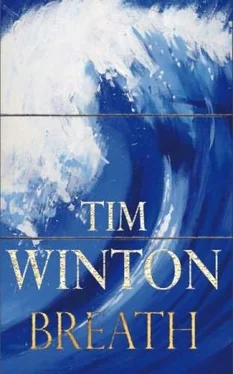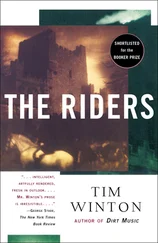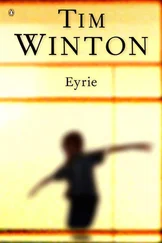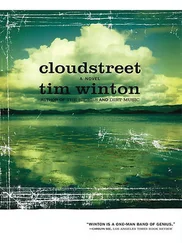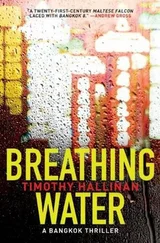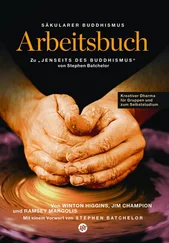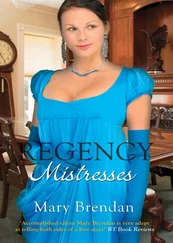Loonie liked anything with an edge on it. There were grindstones in some of the sheds where we worked, and he used them to sharpen our axes and the pocketknife he always carried. Whenever we took a break, when the lady of the house brought us mugs of tea and a few lamingtons, he'd want to play chicken. Most often we used the knife. We spread our hands on the pulpy chopping block, jabbing the blade faster and faster between our fingers — first looking and later blind — until one of us begged off or began to bleed. Some sheds had dartboards, so we played William Tell. A lamington, said Loonie, was just as good as an apple. He invented games involving axes and feet, axes and anything, really. Any game would do as long as it was dangerous.
At each perilous undertaking — and with Loonie there were plenty of them — he always volunteered to go first. For a while I thought it was about honour, that it was his way of taking responsibility for whatever stupid idea he'd come up with — something gentlemanly, perhaps, a mark of friendship — but eventually I saw that Loonie went first out of need; he was greedy about risk. He absolutely loved a dare. He would actually dare you to dare him. This wasn't optional. He required it of you, insisted on it. When it came to things like this he was completely compulsive. Being with him was like standing near a lethal electric current. The hairs on your arms literally stood up and you were afraid and mesmerized, always drawn to connect.
That winter we chopped enough wood to buy ourselves real Surfboards. They were dinged-up and obsolete, the cast-offs of the Angelus crew or somebody's sister's boyfriend, but they were proper foam and fibreglass and they were tokens of our arrival. We scraped the hard, dirty wax from their decks and rubbed them down afresh. We stood them in the old man's shed to admire their leaf-like outlines and the sharky rake of their fins. The old man wasn't at all happy about the fact that I'd been working at the pub but he didn't toss the boards out into the weeds as he'd done with the Coolites. He'd seen the calluses and divots in my hands. He knew I'd earned that surfboard with a bent back and once again, after the longest time, I felt the distant glow of his respect.
On a still morning in late September, in a lull between cold fronts, Loonie and I pedalled with our boards to the Point where the waves were small and clean and the cold water was as clear as the sky. We sat inside at the mellow edge of the rip and paddled into waist-high rollers that carried us hooting and howling in to the beach. We had the place to ourselves. The sandbanks rippled underfoot, schools of herring swerved and morphed as one in the channel, and across in the bay the breaths of breaching dolphins hung in the air.
I will always remember my first wave that morning. The smells of paraffin wax and brine and peppy scrub. The way the swell rose beneath me like a body drawing in air. How the wave drew me forward and I sprang to my feet, skating with the wind of momentum in my ears. I leant across the wall of upstanding water and the board came with me as though it was part of my body and mind. The blur of spray. The billion shards of light. I remember the solitary watching figure on the beach and the flash of Loonie's smile as I flew by; I was intoxicated. And though I've lived to be an old man with my own share of happiness for all the mess I made, I still judge every joyous moment, every victory and revelation against those few seconds of living.
We surfed until we were limp and when we floundered ashore the bloke I'd noticed before was waiting. He sat on the back of a cut-down Kombi with a red dog that sprang down to meet us.
Life on the ocean wave, eh boys? said the bloke with his board-bump knees drawn up to his beard.
My teeth were chattering and I couldn't speak but I nodded. I recognized him as the one who paddled out when the surf was huge, the man with the old-timey board.
You wouldn't be dead for quids, wouldja?
We just shook our heads in agreement and laughed and shuddered while the red dog danced circles around us. The bloke smiled as though we were the funniest sight he'd seen all year. He whistled the dog up and we bolted to where our clothes lay warmed from a day in the sun.
The Volkswagen hawked and sputtered to life. The bloke wheeled it around on the sand and looked at us a moment before offering us a lift. He waited, laughing, while we fumbled numbly with buttons and buckles.
We bounced up the track with the dog lapping at our salty ears. At the top of the hill where our bikes lay in the weeds, he pulled up and we climbed out, burning with pins and needles where the circulation had kicked back in.
You're a pair of hellmen, you two, he said through the cab window.
Why's that? said Loonie.
Surfih bareback in all weather. You're either stupid or broke.
Both, I said.
How old are you?
Thirteen, said Loonie.
Almost thirteen, I said, stretching things a bit.
The bloke had a mass of curly bleached hair and his beard was of the same stuff. He was a big man and muscular, with grey eyes. It was hard to tell his age but he had to be thirty or more and that made him a genuinely old guy. His dog panted and whined beside him but the moment he glared at it the mutt lay silent.
You get tired of haulin your boards out from town, you can leave em at our place.
Neither Loonie nor I said anything to this; we didn't know how to respond.
I'm away a bit, said the bloke. But you can shove em under the house. The missus won't mind.
Geez, I said. Thanks,
No worries.
First driveway. Just up here.
Okay.
He drove off and we looked at one another with a dumb shrug.
I wasn't ready to leave my precious board at anyone's place but my own, yet I was flushed warm from the attention. On our way back, weaving up the bitumen one-handed, with our boards yawing and straining under our arms, we pedalled by the turnoff we'd never paid any mind to before. It was marked with an old green-painted fridge and the dirt track in was rutted and steep. From the road there was no sign of a house, only a wall of karri trees on the ridge. The land was fenced but this wasn't any sort of farm.
Hippies, said Loonie.
We coasted down to the swampy flats and caught our breaths for the hard uphill plug into town.
I never suspected I'd be sent to school thirty miles away in Angelus, and I'm not even sure why my parents enrolled me there. At the time they said it was to give me stability, a high school where I could go right through to my senior year, but I had an inkling it was a manoeuvre to limit Loonies influence. They waited until after New Year's to spring the news, and I was so stunned that I didn't even put up a fight. I was just glad they hadn't sent me to board at the hostel, though I'm certain they'd have been unable to endure the separation. Still, such tenderness condemned me to years of bussing, and the bus ride is my chief memory of high school — the smells of vinyl and diesel and toothpaste, corrugated-iron shelters out by the highway, rain-soaked farmkids, the funk of wet wool and greasy scalps, the staccato rattle of the perspex emergency window, the silent feuds and the low-gear labouring behind pig trucks, the spidery handwriting of homework done in your lap, and the heartbreaking winter dusk that greeted you as the bus rolled back across the bridge into Sawyer. The bus dropped me into a kind of limbo. Until I'd hooked up with Loonie I'd been a loner, and now that I finally had a mate I'd been turned into a dayboy. I could never expect to belong in a big town like Angelus — I was a total stranger there — but now I wouldn't even fit properly into my hometown. Everyone knew proper locals went to the Ag School, while kids who caught the bus to Angelus, dags like me and the banker's daughter, were of some indeterminate species. We were so uncertain of our new status, we never spoke to one another from one term to the next.
Читать дальше
